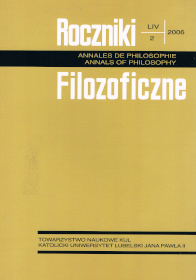Związek filozofii przyrody z naukami przyrodniczymi w ujęciu ks. Zygmunta Hajduka
Abstrakt
Philosophy of nature as “a science in the beginning,” having paved a way for natural sciences, has not lost its impact even today. It suggests new problems and proposes solutions in the domains which the scientific disciplines in question cannot solve because they do not have appropriate tools.
On can notice the relationship between the philosophy of nature and natural sciences in various stages of their development.
It happens so that the overall images of the world are constructed on the basis of the results of natural sciences and philosophical theses. Those theses, i.e. philosophical ideas are introduced as presuppositions into natural sciences, which in turn may generate philosophical problems. One can observe a relationship between natural sciences and various types of the philosophy of nature from the ancient times till today.
The classical tradition had ignored the factor of time in the manners it sought to explain nature and, instead, stressed formal elements in knowledge. This conception of the scientific explanation of nature was questioned by the idea of creation and the Christian conception of history which took the factor of time into account in explanations. The principal change of the hitherto manner of interpretation of phenomena had taken place at the moment of introducing evolutionary ideas into geology and biology. Owing to this genetic explanation appeared, and the conceptual apparatus of the hitherto systems of the philosophy of nature changed.
On the grounds of the essentialising approaches the elements of the philosophy of nature are mixed with the elements of natural sciences.
One can notice also a relationship between the existential approaches of the philosophy of nature and natural sciences.
Much attention is devoted to the relations between natural sciences and the philosophy of nature on the grounds of classical philosophy and in the non-classical positions.
Bibliografia
Gilson E.: Jedność doświadczenia filozoficznego, przeł. Z. Wrzeszcz, PAX, Warszawa 1968.
Hajduk Z.: Filozofia przyrody a filozofia nauki, „Roczniki Filozoficzne” 35 (1987), z. l, s. 177-183.
Hajduk Z.: Nowsze tendencje w filozofii nauki oraz w filozofii przyrody, „Roczniki Filozoficzne” 39-40 (1991-1992), z. l, s. 283-303.
Hajduk Z.: Współczesna postać sporów o koncepcję filozofii przyrody, „Studia Philosophiae Christianae” 1994, nr 2, s. 119-134.
Hajduk Z.: Filozofia przyrody – Filozofia przyrodoznawstwa: Metakosmologia, TN KUL, Lublin 2004.
Heller M.: Filozofia przyrody. Zarys historyczny, Znak, Kraków 2004.
Kamiński S.: Pojęcie nauki i klasyfikacja nauk, TN KUL, Lublin 1981.
Lemańska A.: Filozofia przyrody i nauki przyrodnicze, ATK, Warszawa 1998.
Wildiers N. M.: Ku chrześcijańskiemu neohumanizmowi, przeł. J. Fedorowska, PAX, Warszawa 1967.
Copyright (c) 2006 Roczniki Filozoficzne

Utwór dostępny jest na licencji Creative Commons Uznanie autorstwa – Użycie niekomercyjne – Bez utworów zależnych 4.0 Międzynarodowe.





